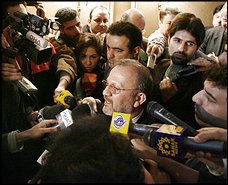Iran Rejects Russia's Proposal on Uranium
The Washington Post:
With Security Council Action Looming, Tehran Takes Stance of 'Wait and See'
By Karl Vick
Washington Post Foreign Service
Monday, March 13, 2006; A12
TEHRAN, March 12 -- Iran rejected an offer from Russia to enrich uranium on its behalf Sunday, closing the door on what had been the most promising diplomatic resolution to international concerns over its nuclear program.
"The Russian proposal is not on our agenda anymore," a Foreign Ministry spokesman, Hamid Reza Asefi, told reporters at a conference on energy and security in the Iranian capital. "The situation has changed. We should wait and see how developments will go on among different states, including the five permanent members of the United Nations Security Council."
Foreign Minister Manouchehr Mottaki told reporters in Tehran that Iran would not use oil as a weapon in the dispute over its nuclear program, but suggested that it might withdraw from the nuclear Non-Proliferation Treaty. (Associated Press)
The Security Council is scheduled to take up the matter this week. The International Atomic Energy Agency last week reported doubts about Iran's nuclear activities to the council, after voting last month to report Iran but delaying the formal action for 30 days while diplomats made a final push on the Russian bid.
No breakthrough occurred, however, and Asefi's dismissal appeared firm. Iran had dismissed the Russian overture when it was first offered last year, insisting that any deal allow uranium enrichment on Iranian soil.
Diplomats said Iran appeared to entertain the proposal later chiefly to stall moves to send the issue to the Security Council. Momentum toward punitive action has been building since fall, when Iran resumed work that France, Britain and Germany said broke an agreement with them to suspend enrichment activities.
"You had the impression it was largely tactical," a European diplomat in Iran, speaking on condition of anonymity, said of the negotiations over the Russian plan. "There were several occasions where the Iranians went to the TV and said, 'We almost have a deal.' "
"We had the impression before" the IAEA board meeting, the diplomat said, "that the Iranians were desperately trying to give the board the impression something was imminent."
Yet the Russian plan remains attractive to the countries aligned against Iran, including the United States, by keeping the riskiest elements of the nuclear fuel cycle outside the country. Russia offered to bring uranium from Iran, enrich it in Russia and gather the spent fuel to assure it was not diverted for military purposes. The United States and some allies suspect Iran intends to develop nuclear weapons; Iran says its program is intended solely to produce energy.
"The Russian proposal from our point of view is still a very good proposal," the diplomat said, "should they ever decide to accept it."
A prominent Russian lawmaker said Iran was hurting its case before the Security Council, where Russia and China, among permanent members with veto powers, are regarded as especially reluctant to impose penalties. The three other permanent members are the United States, France and Britain.
Iran's dismissal "destroys the last and real possibility of a compromise," said Konstantin Kosachyov, chairman of the international affairs committee in Russia's lower house of parliament, the State Duma, the Interfax news agency reported.
"By all accounts, Tehran's decision will seriously radicalize the upcoming debates over the IAEA report in the U.N. Security Council, since trust in Tehran's plans and ambitions has been strongly undermined," he said.
Meanwhile, Iran's foreign minister, Manouchehr Mottaki, said Iran would not use oil as a weapon in the dispute, despite earlier threats by other Iranian officials. In remarks possibly aimed at China, which relies on Iran for more than 10 percent of its imported oil, Mottaki said Iran would continue to supply petroleum to Asia.
But the foreign minister also suggested that Iran might withdraw from the nuclear Non-Proliferation Treaty, following the example of North Korea.
"Iran stresses restoration of its right to access nuclear technology and prefers to make use of internationally recognized mechanisms and benefit from its membership of the Non-Proliferation Treaty," Mottaki said. He added, however, that Iran would "revise its policies if it reaches the conclusion that current mechanisms cannot preserve the Iranian nation's rights."


0 Comments:
Post a Comment
<< Home